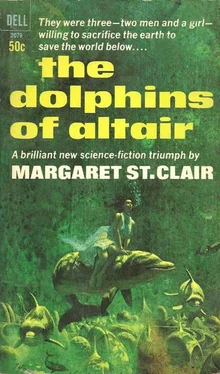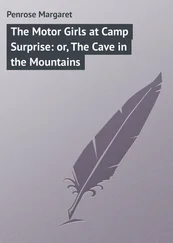Dawn came. We expected Madelaine from moment to moment, but she didn’t come. It was broad daylight, nearly eight o’clock, before she came wading out through the surf to us.
“A man saw me,” she said without preamble. Her eyes were large and luminous, and she was trembling. “I went to the fountain for water, and he saw me. I think he works for the park service.
“He looked at me as if I were a ghost.” She laughed, her teeth chattering. “He asked me what was wrong with my arm—it was bleeding again—and I told him I’d been hurt in the quake. I don’t know whether or not he believed me, but he tied my arm up with his handkerchief.
“Then he went to call the Highway Patrol to have somebody take me to a hospital. He says I need medical care. We must get away before he gets back.”
I hesitated. Perhaps it would be better for Moonlight to let herself be taken to a doctor. Certainly she needed medical attention, and perhaps she could join us later, after her wound had been dressed. As to our pursuers being able to extract damaging information from her, she could not tell them anything that Dr. Lawrence would not have already told.
She seemed to read my thoughts. “Take me with you,” she said urgently. “If we are once separated, we will never be able to find each other again. They’ll hold me without bail once they know who I am, and the navy will be hunting you dolphins all along the coast. Take me with you! I don’t want to leave you. And I can still be of help to you.”
“All right,” Pettrus said, speaking for us all. “Get on my back. But where shall we go?”
“To—it’s darkest under the lamp,” Sosa said, climbing on his back. Movement was obviously not easy for her. “To—yes, they say—to Sausalito. It’s not far. We ought to be safe there, for a while. We can hide under the docks.”
Sausalito is a small city inside San Francisco Bay, more or less opposite the city of San Francisco. It is not a deep-water or industrial port, and its docking facilities are modest. Sosa might be right in thinking we could hide there for a while.
Nonetheless, as we swam southwards, toward the Golden Gate Bridge, I felt exceedingly uncertain that we were doing the right thing. Madelaine might prefer hiding under the docks to being in jail, but at least they would dress her wound and give her food and water in jail. As far as we sea people ourselves were concerned, we rather dislike getting inside closed bodies of water, even waters as extensive as those of San Francisco bay. We are happier with the open sea before us. We have an animal dislike of anything that might be a trap, and the level of radioactivity in the bay is uncomfortably high.
We passed under the Gate Bridge. There was no sound of traffic on it at all. Later we learned that the bridge had been closed to traffic ever since the first earth tremor Sunday morning, which had made the whole structure sway dangerously. Subsequent shocks had cracked some of the concrete slabs on the bridge approach straight across. It would be another week before the engineers would decide the big bridge was sound enough to open to traffic again.
We got to Sausalito a little after nine. Here too there were signs of tidal damage—a boat smashed against the pilings, a slab of concrete broken from a little jetty and hurled high up on land. Nobody at all seemed to be about.
“Keep on going,” Madelaine said softly, aware of how sound carries over water. “Do you see that boat anchored at the end of the rock? Take me around behind it.” “But—” I answered cautiously.
“Nobody will think of looking for me behind a boat at anchor. They say, they say… I’ll be safe there.”
What did she mean? We obeyed her unwillingly. As her feet touched bottom she slipped off Pettrus’ back and staggered toward the dank sand at the end of the striped, fish-smelling darkness.
“My shoulder hurts so,” she said softly. It was the first time we had heard her complain. “I wish we had Sven.” She lurched a few steps forward and collapsed at the far end of the dock.
“Madelaine,” I breathed. “Are you—?”
“Oh, yes, my darlings. I’ll be all right.—Traitor! Traitor! We trusted you!”
Even in the poor light, from the water, we could see a red streak running down her arm from her wound. With a start I realized that her wound was infected, and that she was becoming delirious. It was Dr. Lawrence she was speaking to.
Our brave dear Moonlight! Had we brought her to this dubious refuge to die? I felt a terrible sense of the biological gulf between us. We had no hands, we could not even bring her water. What were we to do?
There a re billions of minds in the world. Each has its separate individuality and its unique character. But to try to isolate any one from all the rest is like trying to pick out a particular grain of sand from a sandy beach.
We thought of using Udra, of course, as soon as we realized how much Madelaine needed help. We knew she did not want to be separated from us; she had already made that clear, and now, even in her delirium, she kept saying, “Don’t let them take me away!” and calling us by name over and over again. But how could we get help that would not involve her being taken away, if only to a hospital? Udra seemed the only possible way out. But there were objections to our using it.
In the first place, the vast majority of Splits are not receptive to Udra at all. Only about one in a hundred thousand makes any response to it. So we would be hunting for one particular grain of sand without having any assurance that the grain really existed.
In the second place, using Udra takes intense concentration. When a dolphin really exerts this faculty, he loses most of his awareness of the world around him. And he is, of course, much more susceptible to attack by an enemy.
Finally, we were afraid that the navy would be able to track us down through our use of Udra. Lawrence had mentioned that various government agencies had been working on the military possibilities of ESP. We did not think the danger was very great—it was a risk we were willing to run—but it bothered us.
We were also bothered by our ignorance of the current state of the navy’s war against the sea people. Probably they were still hunting us; it hardly seemed likely that they would have been satisfied merely to bomb Noonday Rock. But had the navy leaked the substance of Dr. Lawrence’s revelations to the general public? We did not know whether any human being who saw us would feel in duty bound to try to kill us, or whether we dolphins were still among their tolerated animals. We could probably find out by using Udra. But by the time we found out, it might be too late.
Nonetheless, we decided we must try it. Our hope was that we could draw a physician to the dock and that, after he had attended Madelaine, we might be able to assure his silence by appealing to his professional ethics. We knew there was something called the “Hippocratic Oath.” And we might be able to influence the doctor in the direction of silence by using Udra, too.
By the time we had come to this decision, Madelaine, who had been talking so much for a while, had fallen into a sort of stupor. Even in the dim light we could see that the red streak down her arm was longer and brighter. We were so worried that it was hard for us to attain the necessary concentration to begin our Udra use.
I doubt that we would ever have been able to do it, except that the tide began to come in. The radioactivity of the foul water in which we were floating had been a constant vexation to us. The cleaner influx put us more at ease. So our minds were more free.
We floated silently side by side in the freshening water. The world around us began to grow dim. We were reaching out to review minds.
Читать дальше












